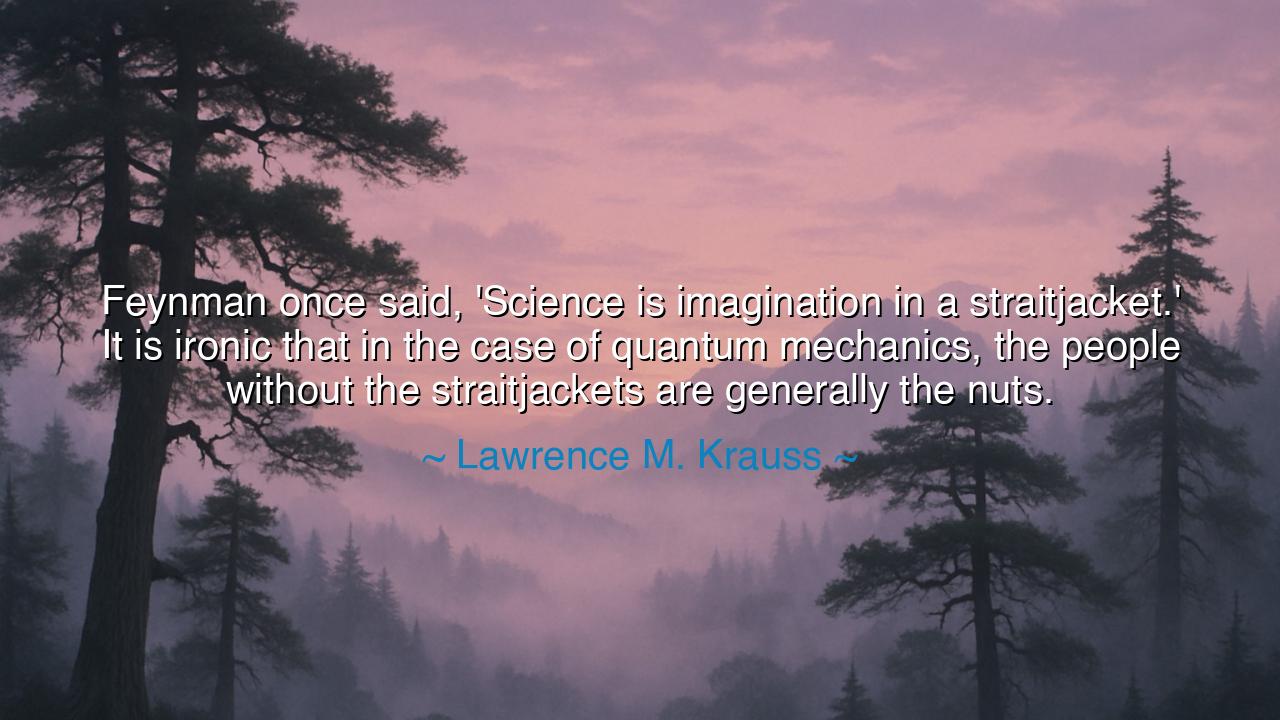
Feynman once said, 'Science is imagination in a straitjacket.' It
Feynman once said, 'Science is imagination in a straitjacket.' It is ironic that in the case of quantum mechanics, the people without the straitjackets are generally the nuts.






“Feynman once said, ‘Science is imagination in a straitjacket.’ It is ironic that in the case of quantum mechanics, the people without the straitjackets are generally the nuts.” Thus spoke Lawrence M. Krauss, the physicist and philosopher who gazes into the deep order of the cosmos and finds both beauty and paradox. In his words, he recalls the insight of Richard Feynman, one of the most brilliant minds of the 20th century — a man who knew that science begins not with certainty, but with imagination, and that the discipline of thought must bind that imagination in the straitjacket of evidence, logic, and experiment. Yet Krauss adds a wry truth to this vision: that when the boundaries of science are loosened entirely, chaos replaces clarity — and those who cast aside discipline in the pursuit of wonder often lose both reason and reality.
The origin of this quote lies in the eternal tension between the dreamer and the skeptic, the visionary and the empiricist. Feynman, in his time, stood at the crossroads of this tension. He saw that science is an act of creation as much as discovery, for one must imagine before one can understand. Every great theory — from Newton’s falling apple to Einstein’s bending spacetime — began first as a leap of the mind, a daring vision of the unseen. Yet the imagination of the scientist differs from that of the poet: it must wear the straitjacket of proof. It cannot wander aimlessly into fantasy; it must move carefully, bound by the laws of observation. Krauss’s comment upon Feynman’s saying is a reminder that when those constraints are abandoned, what remains is not science, but madness disguised as insight.
Nowhere is this tension more apparent than in the strange realm of quantum mechanics — that mysterious domain where particles defy intuition, where matter behaves like waves, and where observation itself seems to shape reality. Here, imagination must stretch to its furthest limits. Even Feynman himself once said, “I think I can safely say that nobody understands quantum mechanics.” And yet, despite its mystery, quantum theory stands as one of the most precise and successful frameworks in all of human knowledge. Why? Because though it demands imagination to conceive, it demands discipline to confirm. It is imagination in a straitjacket — wild vision held steady by mathematical rigor and experimental proof.
Krauss’s irony lies in this: many who are seduced by the wonder of quantum physics lose themselves in its mystery and mistake confusion for wisdom. In the name of “open-mindedness,” they tear away the straitjacket that gives the field its integrity. They claim that consciousness alone shapes reality, or that one’s thoughts can alter the material world, invoking the name of quantum mechanics as if it were a spell. But in truth, they have abandoned the sacred balance Feynman described. For when imagination roams unrestrained by reason, it ceases to illuminate and begins to deceive. What was once the flame of insight becomes the wildfire of delusion.
The ancients, too, knew this dual nature of the mind. The philosopher Plato spoke of the charioteer of the soul, guiding two horses — one of reason and one of passion. Without reason, the chariot veers into madness; without passion, it never moves at all. So it is with science. The imagination is the passion that drives discovery — it dreams of worlds unseen. But reason is the hand that guides it, keeping it upon the road of truth. Krauss’s observation is thus not mockery, but warning: those who would explore the universe must wear both courage and constraint. The dreamer without discipline will wander into darkness, while the thinker without wonder will never leave the ground.
History gives us shining examples of this balance. Albert Einstein, in imagining relativity, did not discard the straitjacket; he rewove it. His vision of the cosmos — that space and time themselves could bend — was born of profound imagination, yet his proofs were anchored in mathematics, in observation, in the stars themselves. So too with Feynman, who dreamed of electrons dancing through infinite paths, and from that dream carved the precise laws of quantum electrodynamics. Their genius was not that they were unbound by limits, but that they learned to move gracefully within them — to let imagination sing while reason kept the rhythm.
So let this be the lesson, O seeker of knowledge: do not despise the straitjacket. It is not a prison but a protection — the vessel that allows the fire of imagination to burn without consuming. The mind must wander, yes, but it must also return. To create is to balance the wildness of the soul with the order of truth. When you dream, dream boldly; when you test, test rigorously. In this dance between freedom and discipline lies the progress of all civilization.
Thus, remember the wisdom of Feynman and Krauss alike: that science is the art of wonder disciplined by humility. The imagination gives us wings, but reason gives us flight. Without both, we are either grounded or lost. To imagine within limits — that is not weakness, but mastery. It is the way of all who would seek truth in the stars and yet keep their feet upon the earth.






AAdministratorAdministrator
Welcome, honored guests. Please leave a comment, we will respond soon